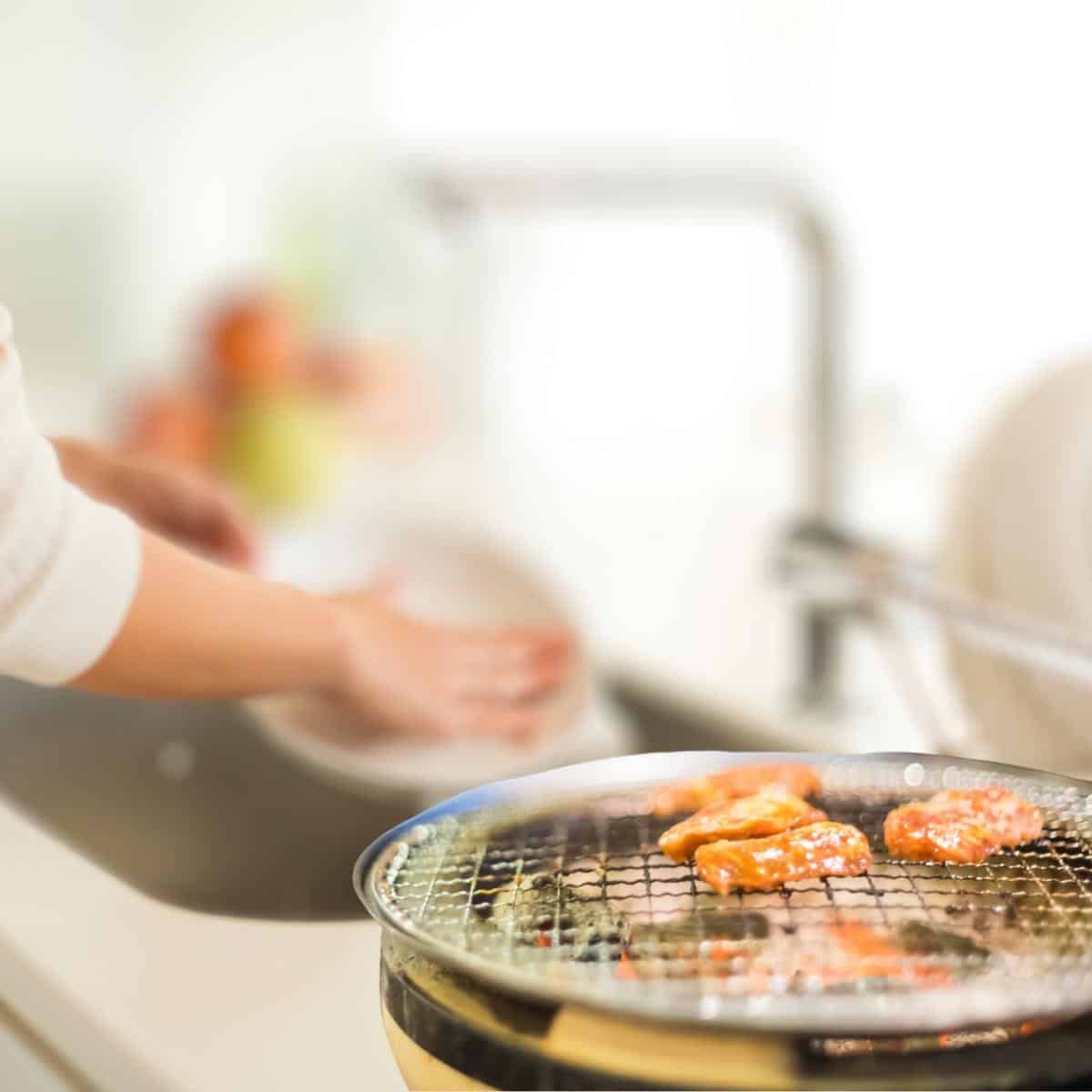How to Clean Yakiniku Grills: 5 Tips & What Definitely Not to Use
Yakiniku is delicious, but the grill can get pretty dirty. How do you clean it?
Cleaning a yakiniku grill isn’t as easy as cleaning a pan because of the ridges and crevices. Plus, don’t use harsh chemicals that could damage the surface. Soak the grill grates with warm water and dish soap for at least 15 minutes and clean the exterior without abrasive cleaners.
In this guide, I’ll show you how to clean a yakiniku grill properly using the right tools and products. Plus, I’ll share some useful tips and tricks that will make the process much easier.


Check out our new cookbook
Bitemybun's family recipes with complete meal planner and recipe guide.
Try it out for free with Kindle Unlimited:
Read for freeIn this post we'll cover:
How to Properly Clean Your Yakiniku Grill
1. Let the grill cool down
Before you start cleaning your yakiniku grill (we’ve reviewed the best grills here), make sure it has cooled down completely. Cleaning a hot grill can be dangerous and may cause burns. Wait for at least 30 minutes before cleaning.
2. Scrape off Excess Food and Grease
Using a grill brush or scraper, remove any excess food or grease from the grill grates. This will make the cleaning process much easier.
3. Soak the Grill Grates
Soak the grill grates in a mixture of warm water and dish soap for at least 15 minutes. This will help loosen any remaining food particles and make them easier to remove.
4. Clean the Drip Tray
Remove the drip tray and clean it with warm water and dish soap. Be sure to remove any excess grease or food particles.
5. Clean the Exterior of the Grill
Using a damp cloth, wipe down the exterior of the grill to remove any dirt or grease. Avoid using harsh chemicals or abrasive cleaners.
6. Store the Grill Properly
Once the grill is clean and dry, store it in a cool, dry place. This will help prevent rust and other damage.
Remember, proper cleaning and maintenance of your yakiniku grill will help extend its lifespan and ensure that it continues to function properly. So, take the time to clean your grill after each use and it will be ready to use again the next time you want to cook up some delicious yakiniku.
What to Use for Soaking a Yakiniku Grill
Soaking is a crucial part of the cleaning process for a yakiniku grill. It helps to remove any remaining food residue and flavors, as well as discoloration and scratches. Here are some things to keep in mind when soaking your grill:
- The longer you soak, the better. Having patience and letting the grill soak for a long time will help to remove any hard-to-clean residue.
- Use warm water. Warm water can help to accelerate the cleaning process by softening any remaining food particles.
- Wait for the grill to cool. Before soaking, make sure the grill has cooled down completely to avoid any damage to the grill or yourself.
- Set aside time for soaking. Soaking can take a bit of time, so make sure you have enough time to let the grill soak properly.
Types of Soaking Products
There are a few different types of products you can use to soak your yakiniku grill. Here are some options:
- Dishwashing liquid: A natural and easy-to-find product that can help to remove any remaining residue.
- Vinegar: A natural abrasive that can help to remove any discoloration or scratches on the grill.
- Roger Stevenson’s Korean BBQ Soak: A product specifically designed for cleaning yakiniku grills that can help to remove any damaged or hard-to-clean areas.
- Cold water: Pouring cold water over the grill after it has cooled down can help to kill any remaining bacteria and remove any remaining residue.
Using Scrub Brushes
After soaking, it’s important to use scrub brushes to remove any remaining residue. Here are some tips for using scrub brushes:
- Use natural brushes: Natural brushes can help to avoid any damage to the grill.
- Mix with dishwashing liquid: Mixing dishwashing liquid with warm water can help to create a cleaning solution that will help to remove any remaining residue.
- Be gentle: Scrubbing too hard can cause damage to the grill, so make sure to be gentle when scrubbing.
- Scrub remaining residue: Make sure to scrub any remaining residue off the grill to ensure it’s completely clean.
Remember, the key to cleaning a yakiniku grill is patience and having the right tools and products. Soaking and scrubbing are important steps in the cleaning process, and using the right products can help to make the process easier and more effective.
Cleaning Tips: Wire vs Non-stick
Cleaning a wire grill can be a real pain, but it’s the easiest and fastest way to get rid of all the burnt residue and grease that comes with grilling. Here are the steps to follow:
- Turn off the grill and unplug it from the power source.
- Let the grill cool down for a couple of minutes.
- Grab a wire brush or steel wool and scrub the grill grates to remove any stuck-on dirt or food.
- Mix a solution of warm water and mild detergent or baking soda and vinegar.
- Soak a damp towel in the solution and wipe down the grates.
- Use a dry towel or paper towel to dry the grates thoroughly.
- Sprinkle a generous amount of baking soda on the grates and let it sit for a couple of minutes.
- Scrub the grates again with the wire brush or steel wool.
- Wipe the grates with a damp towel to remove any residue.
- Let the grates dry completely before using the grill again.
Wire vs Non-stick: Which one is better?
The type of grill you have will depend on your personal preference and grilling needs. Here are some things to consider:
- Wire grills are usually found in Korean barbecue restaurants and offer a strong grilling surface that can handle a lot of grilling. However, they can be a pain to clean.
- Non-stick grills are a good alternative for those who don’t want to deal with the wire cleaning process. However, they can be more expensive and may need to be replaced more often.
- Non-stick grills also offer a way to grill without using a lot of oil or grease, making them a healthier option.
- Some non-stick grills offer a mixed wire and non-stick surface, which can make cleaning easier and faster.
- Chemical compounds and wipes that are highly advertised as cleaning agents for non-stick grills should be avoided as they can damage the non-stick material.
In the end, it all comes down to personal preference and the type of grilling you’ll be doing. Just remember to follow the proper cleaning process for your grill to keep it in good condition and let the grates cool down before cleaning to avoid getting burned.
Is it Safe to Put Your Yakiniku Grill in the Dishwasher?
Before we dive into whether or not your yakiniku grill is dishwasher-safe, it’s important to understand the different types of yakiniku grills available on the market. Here are the most common types:
- Stone grills
- Wire grills
- Non-stick grills
- Steel grills
Each type of grill requires a different cleaning method, and not all of them are dishwasher-safe.
Are All Yakiniku Grills Dishwasher-Safe?
The short answer is no, not all yakiniku grills are dishwasher-safe. Here are a few key things to keep in mind:
- Check the manufacturer’s instructions: Some manufacturers indicate whether or not their product is dishwasher-safe. If they don’t, assume it’s not.
- Wire grills are usually dishwasher-safe: If you have a wired yakiniku grill, it’s normally safe to put it in the dishwasher. Just make sure to remove any stuck-on food residue first.
- Stone grills are not dishwasher-safe: Putting a stone grill in the dishwasher can cause discoloration and damage to the material. It’s best to clean it by hand.
- Non-stick grills depend on the material: Some non-stick grills are dishwasher-safe, while others are not. Check the manufacturer’s instructions to be sure.
- Steel grills may be dishwasher-safe: Some steel grills are dishwasher-safe, but it’s important to check the manufacturer’s instructions to be sure.
What to Avoid When Cleaning Your Yakiniku Grill
Using abrasive materials to clean your yakiniku grill may seem like a good idea, but it can actually cause damage to the grill’s surface. Scrubbing too hard or using a wire brush can scratch the material and cause it to become damaged over time. Instead, opt for a softer cleaning method that won’t cause any harm to the grill’s surface.
Harsh Chemicals
While it may be tempting to use a strong chemical cleaner to get rid of any stubborn residue on your yakiniku grill, it’s important to remember that these types of products can be harmful to both you and the grill itself. Harsh chemicals can cause damage to the grill’s material and may even leave behind toxic residue that could be harmful to your health. Instead, opt for a natural cleaning method that is both safe and effective.
Dishwashing Liquid
While dishwashing liquid may be a good option for cleaning other kitchen items, it’s not the best choice for cleaning your yakiniku grill. This type of soap can leave behind a residue that is difficult to remove and may even cause damage to the grill’s surface. Instead, opt for a specialized cleaning product that is designed specifically for cleaning grills.
Steel Wool
Steel wool may seem like a good option for removing any stuck-on food or residue from your yakiniku grill, but it can actually cause more harm than good. This abrasive material can scratch the grill’s surface and may even cause it to become damaged over time. Instead, opt for a softer cleaning method that won’t cause any harm to the grill’s surface.
Scrapers
While scrapers may seem like a good option for removing any burnt-on food or residue from your yakiniku grill, they can actually cause more harm than good. Scrapers can easily scratch the grill’s surface and may even cause it to become damaged over time. Instead, opt for a softer cleaning method that won’t cause any harm to the grill’s surface.
Remember, having the right cleaning method is crucial to improve the lifespan of your yakiniku grill. Avoiding the things listed above can save you a lot of time, effort, and money in the long run.
Conclusion
Now you can get to work and enjoy your delicious grilled food without worrying about the cleanliness of your grill.
Just remember to use the right cleaning products and tools, and to be patient and thorough. With a little bit of care, your grill will be ready to go for your next grilling adventure!
Check out our new cookbook
Bitemybun's family recipes with complete meal planner and recipe guide.
Try it out for free with Kindle Unlimited:
Read for freeJoost Nusselder, the founder of Bite My Bun is a content marketer, dad and loves trying out new food with Japanese food at the heart of his passion, and together with his team he's been creating in-depth blog articles since 2016 to help loyal readers with recipes and cooking tips.
